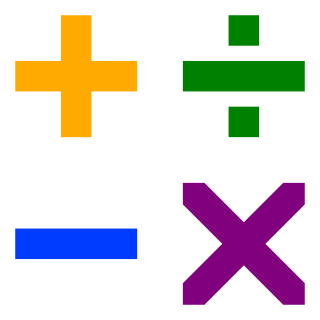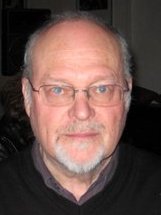
Arithmetic is an elementary branch of mathematics that studies numerical operations like addition, subtraction, multiplication, and division. In a wider sense, it also includes exponentiation, extraction of roots, and taking logarithms.

Numeracy is the ability to understand, reason with, and apply simple numerical concepts. The charity National Numeracy states: "Numeracy means understanding how mathematics is used in the real world and being able to apply it to make the best possible decisions...It's as much about thinking and reasoning as about 'doing sums'". Basic numeracy skills consist of comprehending fundamental arithmetical operations like addition, subtraction, multiplication, and division. For example, if one can understand simple mathematical equations such as 2 + 2 = 4, then one would be considered to possess at least basic numeric knowledge. Substantial aspects of numeracy also include number sense, operation sense, computation, measurement, geometry, probability and statistics. A numerically literate person can manage and respond to the mathematical demands of life.
Dyscalculia is a learning disability resulting in difficulty learning or comprehending arithmetic, such as difficulty in understanding numbers, learning how to manipulate numbers, performing mathematical calculations, and learning facts in mathematics. It is sometimes colloquially referred to as "math dyslexia", though this analogy can be misleading as they are distinct syndromes.

Elementary arithmetic is a branch of mathematics involving addition, subtraction, multiplication, and division. Due to its low level of abstraction, broad range of application, and position as the foundation of all mathematics, elementary arithmetic is generally the first branch of mathematics taught in schools.
Key Stage 3 is the legal term for the three years of schooling in maintained schools in England and Wales normally known as Year 7, Year 8 and Year 9, when pupils are aged between 11 and 14. In Northern Ireland the term also refers to the first three years of secondary education.
Key Stage 4 (KS4) is the legal term for the two years of school education which incorporate GCSEs, and other examinations, in maintained schools in England normally known as Year 10 and Year 11, when pupils are aged between 14 and 16 by August 31.
The National Numeracy Strategy was designed to facilitate a sound grounding in maths for all primary school pupils. It arose out of the National Numeracy Project in 1996, led by a Numeracy Task Force in England, and was launched in 1998 and implemented in schools in 1999. The strategy included an outline of expected teaching in mathematics for all pupils from Reception to Year 6.
Key Stage 2 is the legal term for the four years of schooling in maintained schools in England and Wales normally known as Year 3, Year 4, Year 5 and Year 6, when the pupils are aged between 7 and 11 years.
Fizz buzz is a group word game for children to teach them about division. Players take turns to count incrementally, replacing any number divisible by three with the word "fizz", and any number divisible by five with the word "buzz", and any number divisible by both three and five with the word "fizzbuzz".
The Joint Mathematical Council (JMC) of the United Kingdom was formed in 1963 to "provide co-ordination between the Constituent Societies and generally to promote the advancement of mathematics and the improvement of the teaching of mathematics".
The Association of Teachers of Mathematics (ATM) was established by Caleb Gattegno in 1950 to encourage the development of mathematics education to be more closely related to the needs of the learner. ATM is a membership organisation representing a community of students, nursery, infant, primary, secondary and tertiary teachers, numeracy consultants, overseas teachers, academics and anybody interested in mathematics education.

Curriculum for Excellence is the national curriculum in Scotland, used by Scottish schools for learners ages 3–18. The implementation of Curriculum for Excellence is overseen by Education Scotland, the executive agency of the Scottish Government responsible for the education system in Scotland.
SiMERR is an Australia-wide research body, primarily located at the University of New England in Armidale, Australia. They are best known for their program QuickSmart.
In mathematics education at the primary school level, chunking is an elementary approach for solving simple division questions by repeated subtraction. It is also known as the hangman method with the addition of a line separating the divisor, dividend, and partial quotients. It has a counterpart in the grid method for multiplication as well.
Doon Academy is a secondary school in Dalmellington that caters to the local surrounding areas Dalmellington, Patna, Rankinston and Bellsbank. The current head teacher is Kenneth Reilly who took over from John Mackenzie in 2014.

Brian Vincent Street was a British academic and anthropologist, who was professor of language education at King's College London and visiting professor at the Graduate School of Education in University of Pennsylvania. During his career, he mainly worked on literacy in both theoretical and applied perspectives, and is perhaps best known for his book Literacy in Theory and Practice (1984).
Learning development describes work with students and staff to develop academic practices, with a main focus on students developing academic practices in higher education, which assess the progress of knowledge acquired by the means of structural approaches. Learning developers are academic professionals who: teach, advise and facilitate students to develop their academic practices; create academic development learning resources; and reflect on their own academic practices through a community of practice.
The National Curriculum of Northern Ireland identifies the minimum requirements of skills for each subject and the activities to develop and applied the skills.
National Numeracy is an independent charity based in Brighton, UK, that promotes the importance of numeracy and "everyday maths".
Diana Coben is an adult education academic, and visiting professor of the University of East Anglia. Between 2011 and 2018 she was Director of New Zealand's National Centre of Literacy and Numeracy for Adults and full professor at University of Waikato.




